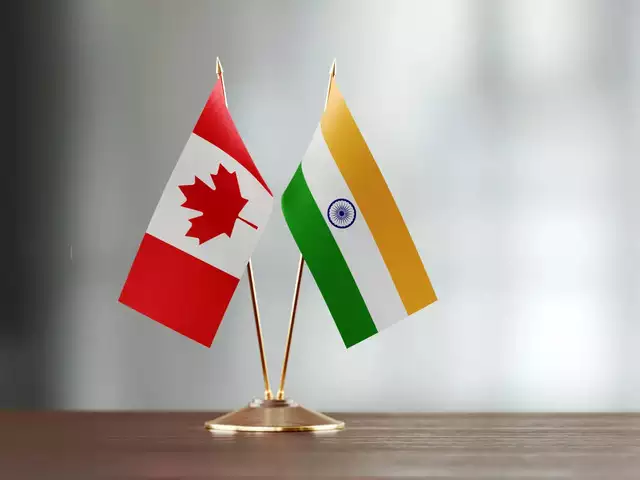Introduction
The India Canada conflict has recently taken center stage, with allegations, security concerns, and diplomatic maneuvers dominating the headlines. This article sheds light on the key developments surrounding this conflict and how they have sparked a flurry of responses from both governments and concerned organizations.
Table of Contents
Allegations and Security Concerns
India Canada Conflict : Controversy Over Hardeep Singh Nijjar’s Killing
The India Canada Conflict escalated amid the controversy surrounding the killing of Khalistan supporter Hardeep Singh Nijjar. The Ministry of External Affairs spokesperson, Arindam Bagchi, addressed the issue, citing significant security concerns as the reason behind a pivotal decision.
Indian Government’s Response
Arindam Bagchi, representing the Indian government, swiftly dismissed allegations of Indian agents’ involvement in Nijjar’s murder. He characterized these allegations as politically motivated and baseless, stressing the lack of concrete evidence. Furthermore, the Indian government highlighted the absence of information from the Canadian authorities regarding this matter.
Trudeau’s Statement
Adding fuel to the fire, Canadian Prime Minister Justin Trudeau publicly suggested that Indian agents could be linked to Nijjar’s murder. This statement raised eyebrows and intensified the already complex India-Canada conflict.
Canada’s Position
Canada’s Response to India’s Concerns
Bagchi emphasized that the Indian government is open to examining any specific information provided by the Canadian government. However, no detailed information has been forthcoming from Canada thus far. During a meeting between Prime Minister Narendra Modi and Canadian PM Justin Trudeau, over 20 such cases were raised, and India has urged Canada to take action on these matters.
Concerns Over Canada’s Safe Haven Status
Bagchi did not mince words when he drew attention to Canada’s hosting of individuals he referred to as “terrorists, extremists, and organized criminals” within its borders. This pointed comment underscored India’s growing unease and added depth to the conflict.
Security Concerns and Visa Services
The Ministry of External Affairs expressed deep concern about the security of Indian diplomatic missions in Canada. These missions have faced threats that have disrupted their regular functions. As a result, the Indian High Commission and consulates in Canada temporarily ceased providing visa services. The situation is under constant review, reflecting the gravity of the security challenges faced by Indian diplomatic personnel.
Host Government’s Responsibility
Arindam Bagchi emphasized that providing security for diplomatic missions is primarily the responsibility of the host government. While India has implemented its security arrangements in some places, discussing them publicly is deemed inappropriate due to the sensitive nature of the situation. The Indian government’s stance underscores its commitment to safeguarding its diplomatic personnel in Canada.
Hindu Organization’s Response
Pannu’s Threat to Hindus in Canada
In a separate development, Khalistani activist Gurpatwant Singh Pannu issued a threatening message to Hindus living in Canada, urging them to leave the country. This alarming threat prompted an immediate response from the Hindu community and organizations.
Hindu Forum Canada’s Letter
Canadian Hindus, represented by the ‘Hindu Forum Canada,’ wasted no time in conveying their concerns. They addressed a letter to Canada’s Minister of Public Safety, Dominic LeBlanc, outlining their apprehensions about Pannu’s statements. The letter made a strong appeal to classify Pannu’s message as a hate crime.
The Intent to Target Ideological Dissent
The Hindu organization’s letter stressed that Pannu and his Khalistani associates have made their intentions clear. They seek to target individuals who do not align with their ideology, presenting a clear and present danger that must be addressed by the Canadian government.
Freedom of Expression vs. Hate Crime
The letter also posed a critical question: Should Pannu’s statements be considered an exercise of freedom of expression, or should they be treated as a hate crime? This query highlights the complexities of navigating issues related to freedom of speech in the face of potential threats.
India Canada Conflict: Diplomatic Tensions and Security Concerns
Conclusion
The India Canada conflict continues to evolve, driven by allegations, security concerns, and diplomatic actions. As both nations grapple with these challenges, the world watches closely. The conflict underscores the delicate balance between safeguarding national interests, preserving diplomatic ties, and respecting fundamental freedoms. How India and Canada manage this intricate web of issues will determine the trajectory of their relationship in the coming years. Stay tuned for further developments in this complex and evolving conflict.
